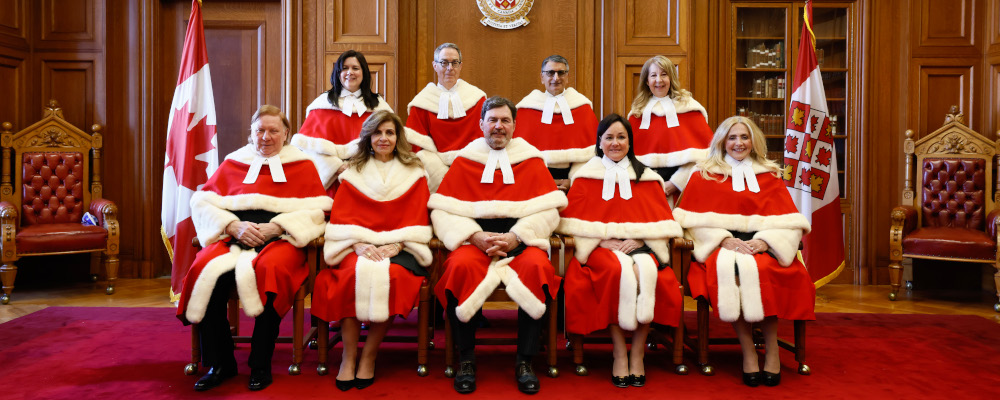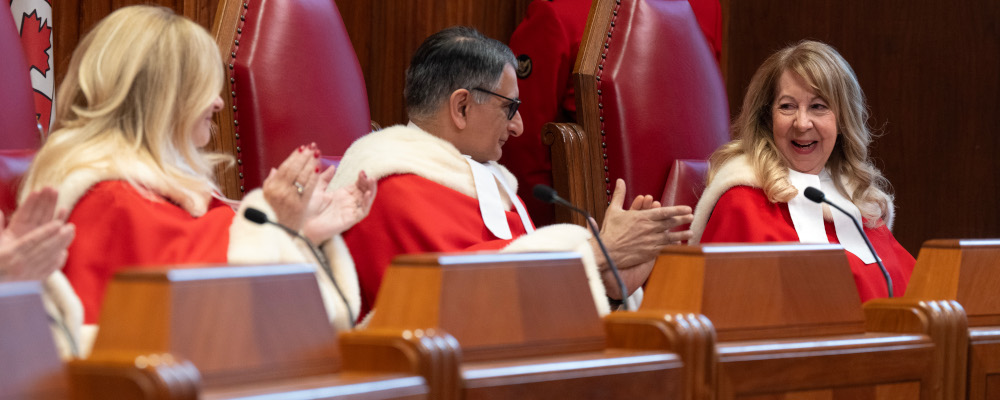The official X account of the Supreme Court of Canada recently tweeted that “Achieving gender parity among judges at all levels in Canada is a step in the right direction towards having greater diversity on the bench.” No doubt many people agree with this statement. But that does not make it appropriate.
That is because it is a political position about the “right” direction to take the country—and a contentious political statement at that. In the United States, about two in three Americans (68 percent), including a majority in each ethnic group, said that last year’s ruling by the Supreme Court of the United States ending the use of race and ethnicity in university admission decisions is “mostly a good thing.” In Canada, one poll has suggested that a significant majority of Canadians would support a constitutional amendment to prohibit affirmative action programs.
Of course, the Supreme Court should not be making statements one way or the other based on what a majority of the population thinks. That is exactly the point. The Supreme Court must decide cases according to law, not according to politics.

As the Supreme Court has explained, “public confidence in our legal system is rooted in the fundamental belief that those who adjudicate in law must always do so without bias or prejudice and must be perceived to do so.”Wewaykum Indian Band v. Canada 2003 SCC 45,[2003] 2 SCR 259 ¶ 57. Bias or prejudice means “a leaning, inclination, bent or predisposition towards one side or another or a particular result…it represents a predisposition to decide an issue or cause in a certain way which does not leave the judicial mind perfectly open to conviction.”Wewaykum Indian Band v. Canada 2003 SCC 45,[2003] 2 SCR 259 ¶ 58. In order to ensure public confidence in the courts, even the appearance of bias must be avoided. That is why judges cannot speak publicly on any matter that may come before them. Issues relating to affirmative action are not only political, they are also legal.
For example, the Ontario Human Rights Tribunal has held that it is not contrary to the province’s Human Rights Act to discriminate against white people.Lisikh v. Ontario (Education), 2022 HRTO 1345 (CanLII) ¶ 19. If that case, or one like it, were to be appealed to the Supreme Court, could we be confident that the Court does not have a predisposition to decide the issue a certain way?
This is a particularly unfortunate time for the Supreme Court to be chiming in on this political issue. It is well-known within the legal profession that the Trudeau government is aggressively pursuing an agenda of diversity hiring in appointments to the judiciary. The Supreme Court of Canada should not be seen as endorsing a divisive political agenda that relates so directly to the demographic composition and ideological orientation of the judiciary.
It might be said that there can be no objection to the Court endorsing an affirmative action program because section 15(2) of the Charter permits affirmative action. But just because a governmental policy is constitutionally permissible does not mean that it is normatively desirable. Applying affirmative action to judicial appointments is a controversial political decision. Even if it were clearly constitutional, it would not be appropriate for the Supreme Court to act as a cheerleader.
Suppose the Court had decided a case on the constitutionality of carbon taxing and decided in a unanimous decision that the tax was clearly constitutional. It would nonetheless be inappropriate for the Court to tweet the next day “The carbon tax is a great policy measure that we wholeheartedly endorse.” Any such statement would cause us to question whether the Court had come to its conclusion based on legal reasoning or on the basis of partisan politics. We aspire—or we used to aspire—to a Court that is above the political fray.

Further, it is one thing to say that the Charter protects affirmative action programs and another to say that a particular affirmative action program is constitutional. Suppose an affirmative action program provided that disadvantaged youth of South Asian, East Asian, Hispanic, or Pacific Islander background could apply for a full university scholarship, but youths of an African background were ineligible. Would that be constitutional? That would turn on the interpretation of section 15(2). The fact that the Charter permits affirmative action in broad terms does not mean that it permits a program such as just described. Any legal question turns on the details of the law and the specific facts at hand, and in the absence of legal analysis and evidence, it is inappropriate for the Court to comment.
The Court followed up by tweeting that “Canadians need to see themselves reflected in their judiciary because that builds trust in our democratic institutions.” This raises similar problems. Again, this is a very common sentiment—but is it true? At least one study shows support for the intuition that same-race judges are more likely to impose harsher sentences, which might suggest that criminal defendants would prefer a judge of a different ethnicity. Of course, one study does not establish this is true, and even if it is true, it is debatable as to whether that should influence how judges should be appointed.
But that is the point: that people prefer judges of their own ethnicity is debatable, not a self-evident truth. More generally, is it true that Canadians are so race-conscious that their trust in the judiciary is based on the ethnicity of the judges, rather than on the care and transparency of the process and reasons? That is an emotional and disputed question, and the truth lies in facts and evidence, not intuition.
It is inappropriate for the Supreme Court to be making extra-judicial statements on controversial matters of fact and policy. The official X account of the Supreme Court of Canada is written by staff, not by the judges themselves, and this particular tweet was probably the work of a young staffer. But social media is the new town square. Canadians will reasonably look to official social media statements as a reflection of the views of the Court itself. Presumably, the chief justice has authority over the account. Whether this tweet reflects the actual views of the Court or merely appears to do so, public confidence in the Supreme Court as an institution has been undermined.
Recommended for You

‘Our role is to ask uncomfortable questions’: The Full Press on why transgender issues are the third rail of Canadian journalism

Need to Know: Mark Carney’s digital services tax disaster

Theo Argitis: Carney is dismantling Trudeau’s tax legacy. How will he pay for his plan?

Kirk LaPointe: B.C.’s ferry fiasco is a perfectly Canadian controversy



